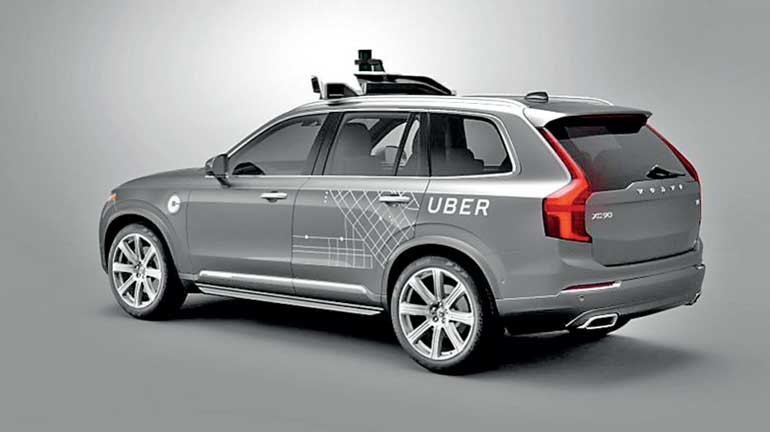Saturday Feb 21, 2026
Saturday Feb 21, 2026
Monday, 27 November 2017 00:00 - - {{hitsCtrl.values.hits}}
MUMBAI (Reuters): Ride-hailing firm Uber will partner with automaker Mahindra and Mahindra to pilot electric vehicles on its platform in India, the two companies said on Friday, at a time when the government is pushing to have all new vehicles electrified by 2030.
Uber will deploy hundreds of electric vehicles in Delhi and Hyderabad by March next year and will consider expanding the pilot to other cities, Madhu Kannan, the company’s chief business officer for India and emerging markets told reporters in Mumbai.
“For how long this pilot will go on is difficult to predict ... It will require adequate progress in engagement with our stakeholders before we plan to expand to other cities,” Kannan said, adding that Uber so far has no major roll-out targets for electric vehicles in India.
Uber joins local rival Ola, backed by Japan’s SoftBank Group, which earlier this year launched a pilot for electric cars in the western city of Nagpur and is planning a large-scale roll-out by next year.
India is working on a new policy for electric vehicles but the auto industry is skeptical about its success due to the high cost of batteries and lack of charging infrastructure which they say could make the whole proposition unviable.
Electric car sales in India, one of the world’s fastest-growing car markets, are negligible compared with annual sales of over 3 million petrol and diesel cars last fiscal year, industry data showed.
But the government is determined and plans to push the use of cleaner technology vehicles through public transportation.
“Our collaboration with Uber is an important next step to help accelerate the large scale adoption of electric vehicles on share mobility platforms and meet the nation’s vision for EVs,” Mahindra’s managing director, Pawan Goenka, said.
As part of the deal, Uber will initially subsidise the cost of electric cars for its drivers and Mahindra will also provide finance, insurance and after-sales service. The two companies will also work with public and private firms to set up charging stations for the cars in Hyderabad.
Mahindra has previously said it would invest 6 billion rupees ($93 million) over the next two to three years to develop electric vehicles. The carmaker is currently working on two electric passenger vehicles, including one with its South Korean unit Ssangyong Motor Co, Goenka said.
Mahindra also has a partnership with Ola in which the ride-hailing company agreed last year to procure 40,000 vehicles, including electric variants.

Stockholm/San Francisco (Reuters): Uber plans to buy up to 24,000 self-driving cars from Volvo, marking the transition of the U.S. firm from an app used to summon a taxi to the owner and operator of a fleet of cars.
The non-binding framework deal could offer San Francisco-based Uber a way to overcome setbacks at its autonomous driving division in Silicon Valley’s race to perfect self-driving systems.
Combining Volvo’s cars with Uber’s self-driving system builds on their nearly three-year relationship and comes as Uber’s autonomous driving unit has been hit by a lawsuit over trade secrets and the departure of top talent.
Automakers, ride-hailing firms and tech startups have been forging loose alliances in an effort to advance self-driving technology and claim a piece of what is expected to be a multi-billion-dollar business.
Geely-owned Volvo said in a statement on Monday it would provide Uber with its flagship XC90 SUVs equipped with autonomous technology as part of a non-exclusive deal from 2019 to 2021. A Volvo spokesman said it covered up to 24,000 cars. The self-driving system that would be used in the Volvo cars – which have yet to be built – is under development by Uber’s Advanced Technologies Group.
Should Uber buy all 24,000 cars, it would be Volvo’s largest order by far and the biggest sale in the autonomous vehicle industry, giving Uber, which is losing more than $600 million a quarter, its first commercial fleet of cars.
A new Volvo XC90 typically retails from a starting price of around $50,000.
Uber has been testing prototype Volvo cars for more than a year, with safety drivers in the front seat to intervene if the self-driving system fails, in Tempe, Arizona and Pittsburgh.
“Our goal was from day one to make investments into a vehicle that could be manufactured at scale,” Jeff Miller, Uber’s head of automotive alliances, said.
The cars, in theory, would be available through the Uber app to pick up passengers without a driver.
“It only becomes a commercial business when you can remove that vehicle operator from the equation,” Miller said.
No financial details were disclosed for the purchase, which would be a massive new investment for Uber and mark a change from Uber’s long-standing business model where contractor drivers buy or lease and maintain their own cars.